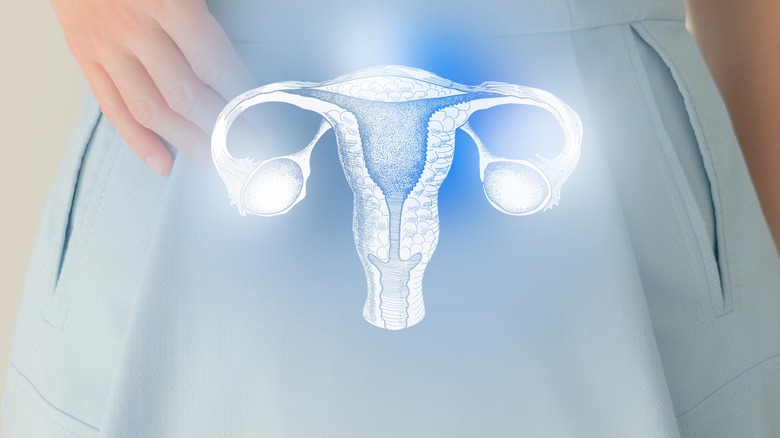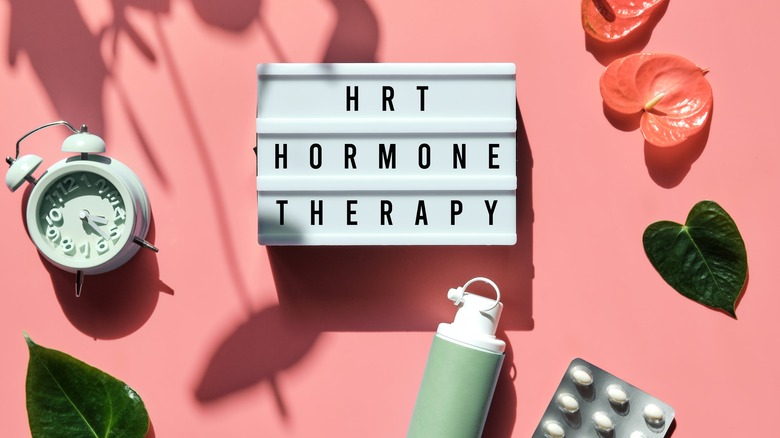Everything You Need To Know About Perimenopause
Irregular periods? Mood swings? Brain fog? If you're a woman in your 40s, it's probably not you. It's perimenopause. During your reproductive years, your ovaries make most of the estrogen hormone responsible for your menstrual period (via Cleveland Clinic). As you get older, your body produces less estrogen, and these hormonal changes significantly affect your body. Perimenopause usually starts in your 40s, although it can start up to two years earlier if you smoke, according to The North American Menopause Society.
Each woman's journey through perimenopause is different. Although the average length is four years, perimenopause can be as short as a few months or as long as 10 years (via WebMD). Menopause begins when your body doesn't produce enough estrogen to release an egg. However, your doctor won't confirm menopause until you've gone 12 months without a period, says Healthline. You'll most likely experience symptoms of perimenopause and menopause until that last period occurs.
Symptoms of perimenopause
Healthline explains that the symptoms of perimenopause and menopause are slightly different, but they both emerge from the same cause — declining estrogen levels. During perimenopause, your periods might become irregular even if you've had a regular period all your life. These periods could be heavier or lighter, and your PMS might be off the charts. This means your breasts could be more tender and you could see the numbers on the scale increase. Other parts of your body might see symptoms of perimenopause, too. You could experience headaches or brain fog, or your muscles might start aching.
As the estrogen begins to significantly drop in the last few years of perimenopause, you could experience signs of menopause. According to The North American Menopause Society, the most common symptom is hot flashes. These typically last from one to five minutes, and they're usually followed by a brief chill. Similarly, night sweats could interrupt your sleep. You could also experience vaginal dryness, which might make sex rather painful. Healthline notes that menopause can produce mood swings, anxiety, or depression. You also might see your cholesterol levels increase (via Mayo Clinic).
Treatments for perimenopause and menopause symptoms
Your doctor could prescribe hormone replacement therapy to help with hot flashes, according to Johns Hopkins Medicine. This will help your body adjust to the fluctuations in estrogen. However, you should talk to your doctor first about the potential risks. Breastcancer.org states that higher doses of estrogen-progesterone therapy can increase your risk of breast cancer. Although estrogen-only hormone therapy is not linked to breast cancer, it has been connected with endometrial and ovarian cancers.
Gabapentin, which is usually prescribed for seizures, can also help with hot flashes (via Healthline). Vaginal creams can help with dryness, and antidepressants can balance your mood swings. Exercise can also help with your mood swings, weight gain, and hot flashes, so be sure to stay active through perimenopause. Healthline also suggests incorporating an evening relaxation practice such as yoga to help you combat insomnia. Consider drinking alcohol in moderation and limiting your caffeine intake to the morning hours. Johns Hopkins Medicine advises keeping a journal of your perimenopause symptoms and noting when and what triggered your hot flashes.
Alternative remedies for perimenopause symptoms
The North American Menopause Society explains that some women have found relief for their perimenopause symptoms through natural supplements. Black cohosh and red clover are relatively safe herbs used to help with hot flashes with few side effects. Although dong quai is an herb used in traditional Chinese medicine to help women, it may interact with warfarin or other medications that pertain to clotting. If you have fibroids, you should avoid dong quai.
Ginseng might not help with hot flashes, but it might ease perimenopause-related mood swings and insomnia. Kava might also tame anxiety, but it's been connected to liver damage. Evening primrose oil has gamma-linolenic acid and linolenic acid that cool inflammation, according to Healthline. Although some have found it to relieve hot flashes, evening primrose oil can have side effects such as headaches, diarrhea, and seizures.
The isoflavones in soy can help with plunging estrogen levels, according to Healthline. You can find it in soy milk, edamame, and tofu, but it might interact with antidepressants. Pine bark extract also has plant-based hormones that can help with hot flashes and symptoms of perimenopause. However, because many herbs and natural supplements aren't regulated, be aware that different brands will have different levels of quality and ingredients (via WebMD). It's best to check with your doctor.
When to see a doctor
Your menstrual cycles will change during perimenopause, writes WebMD. If your periods are unusually heavy with blood clots or your periods last several days longer than usual, check with your doctor to be sure it's perimenopause and not something else. According to Dignity Health, needing to change your pad or tampon every two hours should be addressed by your doctor. You should also check with your doctor if you're spotting frequently between periods or having several periods shorter than every three weeks. According to Cleveland Clinic, abnormal bleeding during menopause could indicate conditions such as infection, fibroids, endometrial polyps, or cancer.
Dignity Health also suggests seeing your doctor if you miss your period and your abdomen swells or is uncomfortable. Even though your periods are irregular during perimenopause, you could still become pregnant, according to Cleveland Clinic. See your doctor about family planning if you don't want to have more children.
Entering postmenopause
According to Cleveland Clinic, you've reached menopause when you haven't had a menstrual period for a full year. During postmenopause, your hot flashes and mood swings should be a little milder, although you might still experience vaginal dryness. You may also experience depression, dry skin, incontinence, or hair loss. Even though perimenopause lasts for a certain number of months or years, postmenopause will last the rest of your life.
Some health risks develop during perimenopause that might become worse during postmenopause. For example, your cholesterol levels will creep up during perimenopause, but your risk of cardiovascular disease can be much higher during postmenopause. As women age, they become less active, which can exacerbate high cholesterol and high blood pressure. Therefore, you'll need to remain active and keep a healthy diet postmenopause.
While your estrogen levels drop during perimenopause, you'll continue to have low levels of estrogen during postmenopause. This leads to decreasing bone mass by up to 2% a year. You could develop osteoporosis, making you more susceptible to fractures of the hip, wrist, or spine. You can take steps now to keep your bones healthy by taking a calcium supplement with vitamin D.
Through perimenopause, menopause, and postmenopause, you'll want to see your doctor regularly to maintain overall wellness.






